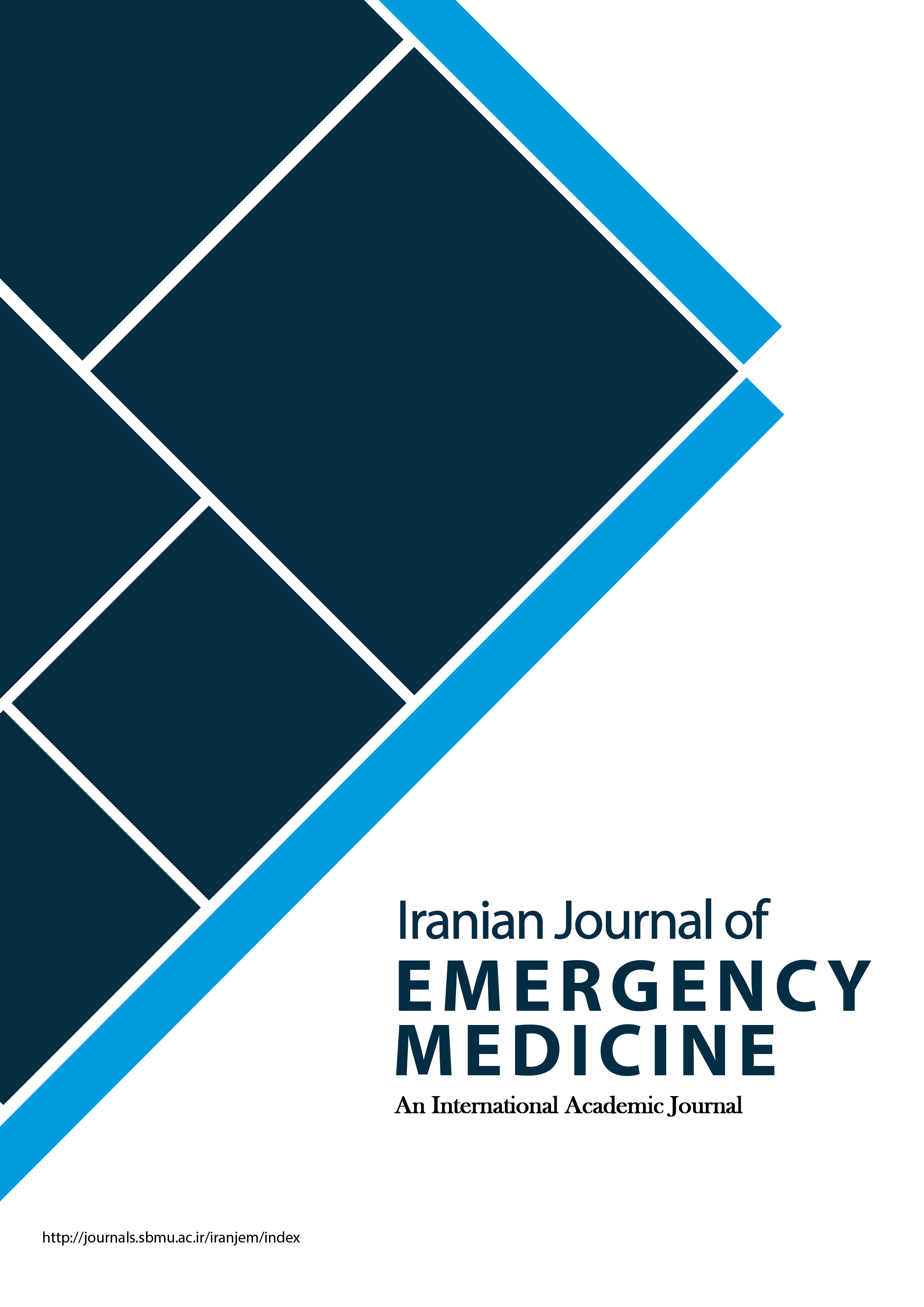Effect of Education on Knowledge and Attitude Regarding Bioterrorism
Iranian Journal of Emergency Medicine,
Vol. 2 No. 2 (2015),
23 May 2015
,
Page 76-81
https://doi.org/10.22037/ijem.v2i2.8946
Abstract
Introduction: Bioterrorism, as a major health problem, has received lots of attention in recent years. To date, the effect of education on knowledge and attitude of students regarding bioterrorism has not been evaluated in Iran. Therefore, this study aimed to determine how education affects knowledge and attitude of biological sciences students about bioterrorism. Methods: The present interventional before-after study was carried out on the students of different branches of biological sciences. The students’ level of knowledge on nature of bioterrorism and its causatives, diagnosing bioterrorism agents, management at the time of biological and bioterrorist attacks, and tendency to participate in relief at these events were evaluated before and after training using a pre-designed checklist. Then the effect of education on the students’ knowledge and attitude was evaluated based on their sex. Results: 120 students were included (60% female; mean age 21 ± 3.2 years). The knowledge score was not significantly different between female and male students before educational intervention (p > 0.05). After education, the knowledge score raised significantly in the 4 areas of bioterrorism nature (p < 0.0001), causative factors (p < 0.0001), diagnosing bioterrorism agents (p < 0.0001), and management at the time of bioterrorist attacks (p < 0.0001) in female participants, but not in male students (p > 0.05). In addition, after education both male and female participants showed greater tendency to work and do research in the field of bioterrorism (p < 0.0001) but the increase was more significant in females (p < 0.0001). Conclusion: Educational intervention led to an improvement in female participants’ knowledge regarding bioterrorism nature, causative factors, diagnosing bioterrorism agents, and management at the time of bioterrorist attacks. Yet, the low level of knowledge and tendency of the students indicates the need for more education in this field.- بیوتروریسم؛ سطح آگاهی؛ میزان آمادگی
How to Cite
References
Gershon RR, Qureshi KA, Sepkowitz KA, Gurtman AC, Galea S, Sherman MF. Clinicians’ knowledge, attitudes, and concerns regarding bioterrorism after a brief educational program. J Occup Environ Med. 2004;46(1):77-83.
Anderson PD. Bioterrorism: toxins as weapons. J Pharm Pract. 2012;25(2):121-9.
Longo DL, Adalja AA, Toner E, Inglesby TV. Clinical Management of Potential Bioterrorism-Related Conditions. N Engl J Med. 2015;372(10):954-62.
Greub G, Grobusch MP. Bioterrorism: myth or reality? Clin Microbiol Infect. 2014;20(6):485-7.
Robertson AG, Robertson LJ. From asps to allegations: biological warfare in history. Mil Med. 1995;160(8):369-73.
Riedel S. Biological warfare and bioterrorism: a historical review. Proc (Bayl Univ Med Cent). 2004;17(4):400-6.
Bravata DM, McDonald KM, Smith WM, et al. Systematic review: surveillance systems for early detection of bioterrorism-related diseases. Ann Intern Med. 2004;140(11):910-22.
Henderson DA. Bioterrorism as a public health threat. Emerg Infect Dis. 1998;4(3):488-92.
Osterholm MT, Scheld W, Craig WA, Hughes JM. Bioterrorism: A real modern threat. Emerg Infect. 2001:213-22.
Goodier J. Encyclopedia of Bioterrorism Defence. Ref Rev. 2012;26(3):34-5.
van Courtland Moon JE. Pathogens for War: Biological Weapons, Canadian Life Scientists, and North America Biodefence by Donald Avery (review). Bull Hist Med. 2014;88(2):395-7.
Wetter DC, Daniell WE, Treser CD. Hospital preparedness for victims of chemical or biological terrorism. Am J Public Health. 2001;91(5):710-6.
Rebmann T, Mohr LB. Bioterrorism knowledge and educational participation of nurses in Missouri. J Contin Educ Nurs. 2010;41(2):67-76.
Brown C, editor Are Nurses Prepared for a Radiological Disaster?: Assessing the Knowledge of Nursing Students to Support the Need of Integrating Radiological/Disaster Content Into Nursing Curricula. Sigma Theta Tau International's 25th International Nursing Research Congress; 2014; Hong Kong: Sigma Theta Tau International.
Aghaei N, Nesami MB. Bioterrorism education effect on knowledge and attitudes of nurses. J Emerg Trauma Shock. 2013;6(2):78-83.
Hosseini S, Aghaee N. Evaluation of education effects on prevention and treatment of bioterrorism on knowledge and attitude of nurses of Mazandaran medical university. MilMed Journal. 2008;9(4):295-301. [persian].
- Abstract Viewed: 820 times
- PDF (فارسی) Downloaded: 590 times
- HTML (فارسی) Downloaded: 165 times



